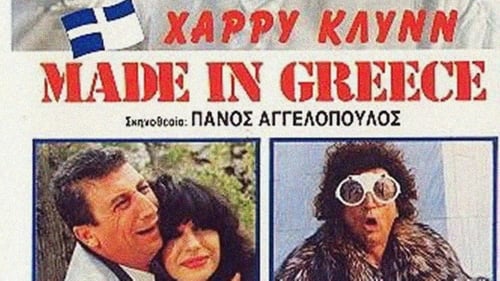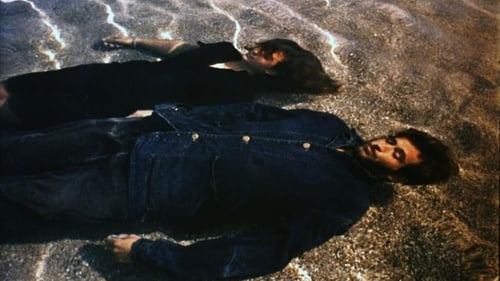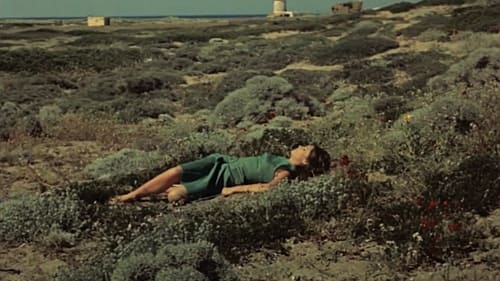Costas Ferris
Nacimiento : 1935-04-18, Cairo, Egypt
Historia
Costas Ferris is a Greek film director, writer, actor, and producer. He wrote the lyrics of Aphrodite's Child's album 666. His 1983 film Rembetiko won the Silver Bear at the 34th Berlin International Film Festival.

Leko
The Lecco, an art collector, promises to help him, asking him to return to bring him a valuable vase from the archaeological museum of Amorgos, stealing it and replacing it with a copy. Alkis accept and go on Amorgos where he meets a girl, Ariadne. The divine aura of mysterious girl, no one on the island knows or has seen in captivates and entangles in a strange metaphysical conundrum, where added and the sudden death of Lecco.

A young drifter working on a river barge disrupts his employers' lives while hiding the fact that he knows more about a dead woman found in the river than he admits.

Director
The film adaptation for the modern era of the ancient tragedy The Bacchae. Pentheus is celebrating his birthday, and surreal scenes unfold before his eyes, arousing doubts in the celebrant as to whether the things he is experiencing are real. Written by Greek Film Archive

Director

Giannis Giannakis, released from psychiatric hospital after many years, decides to return home to his parents. On his way back he slowly discovers that the outside world is crazier than he thought - and starts to question whether he'd be better off back in the psychiatric ward.

Mexican singer
Narra la historia de un grupo de soldados, que durante el curso de su servicio militar en 1967 y 68, antes y durante la dictadura militar en Grecia, son asignados para la recién fundada televisión del ejército. Nominada a mejor dirección en el Festival de Berlín y con dos secuelas: "Loufa kai parallagi: Seirines sto Aigaio" (2005) y "I-4: Loufa & apallagi" (2008). (FILMAFFINITY)

Producer
The story of a group of Rembetes, singers and musicians of the Greek equivalent to the blues, in the early decades of the 20th century, seen through the eyes of a young female singer.

Writer
The story of a group of Rembetes, singers and musicians of the Greek equivalent to the blues, in the early decades of the 20th century, seen through the eyes of a young female singer.

Director
The story of a group of Rembetes, singers and musicians of the Greek equivalent to the blues, in the early decades of the 20th century, seen through the eyes of a young female singer.

Screenplay
Feature film.

K...
Feature film.

Writer

Director

Director
A speculation on power, using the film image to experiment with and explore a combination of elements, such as eastern philosophy, pop culture and music. Based on Aeschylus "Prometheus Bound"

Writer
A speculation on power, using the film image to experiment with and explore a combination of elements, such as eastern philosophy, pop culture and music. Based on Aeschylus "Prometheus Bound"

In this political drama, a journalist accused as a conspirator in the murder of an American colleague is released for lack of evidence, and then searches for the true culprits. Inspired by the true events of the murder of American journalist George Polk, this film was shot in 1967 and was banned by the coming military dictatorship in Greece. It had only been shown abroad, until it premiered in 1974 after the dictatorship's fall .

Screenplay
An adaptation of one of the greatest greek novellas ('The Murderess' by Alexandros Papadiamantis). Fragkogiannou (Maria Alkaiou), a hard-done by, deranged woman after a life full of hardship, recalls the past by her newborn girl grandchild’s crib. Her mother was a wicked woman and one of her sons was a criminal. Lost in a haze, she strangles the baby as she is concvinced that girls can cause their family only trouble. Later, she lets a little girl drown in a well, while she drowns three other little girls, one of whom is a newborn baby. This is her way of sparing children and parents of the inevitable suffering in life.

Director
An adaptation of one of the greatest greek novellas ('The Murderess' by Alexandros Papadiamantis). Fragkogiannou (Maria Alkaiou), a hard-done by, deranged woman after a life full of hardship, recalls the past by her newborn girl grandchild’s crib. Her mother was a wicked woman and one of her sons was a criminal. Lost in a haze, she strangles the baby as she is concvinced that girls can cause their family only trouble. Later, she lets a little girl drown in a well, while she drowns three other little girls, one of whom is a newborn baby. This is her way of sparing children and parents of the inevitable suffering in life.

An apocalyptic vision of man after a cosmic catastrophe, this film is a terrifying metaphor of a dehumanized future. The Brazilian Cinema Novo, German expressionism of the twenties, and the ideologically motivated ‘cruelty’ of a Buñuel come together in this ferocious work of a French theatre collective – an ambitious, almost completely successful example of visual cinema at its best.

Writer
An apocalyptic vision of man after a cosmic catastrophe, this film is a terrifying metaphor of a dehumanized future. The Brazilian Cinema Novo, German expressionism of the twenties, and the ideologically motivated ‘cruelty’ of a Buñuel come together in this ferocious work of a French theatre collective – an ambitious, almost completely successful example of visual cinema at its best.

Assistant Director
A cinematographic poem in the form of variations around the theme of Robinson, a utopian fable freely inspired by Daniel Defoe's novel, which speaks above all of solitude: the immense weakness of today's man in the face of loneliness is no longer that of the hero of the eighteenth century.

First Assistant Director
A Bullet Through the Heart (French: Une balle au cœur, Greek: Μια σφαίρα στην καρδιά) is a 1966 Franco-Greek film directed by Jean-Daniel Pollet. Francesco, a young Sicilian aristocrat, scars an aging gangster who has set out to take away his property. The gangster vows to obtain vengeance, and Francesco is forced to flee across Greece with his girl friend, pursued by his antagonist's vicious henchmen.

A Bullet Through the Heart (French: Une balle au cœur, Greek: Μια σφαίρα στην καρδιά) is a 1966 Franco-Greek film directed by Jean-Daniel Pollet. Francesco, a young Sicilian aristocrat, scars an aging gangster who has set out to take away his property. The gangster vows to obtain vengeance, and Francesco is forced to flee across Greece with his girl friend, pursued by his antagonist's vicious henchmen.

Editor
A Costas Ferris' short featuring two of the best greek songs. Back in 1961 this film was expelled from Thessaloniki Film Festival because of the lyrics of these songs. They belonged to the rembetiko genre that used to over-emphasize the pleasure of using drugs. The worst thing was that Acropolis was shown in a plan and that lead the government to completely ban the film as anti-touristic!

Writer
A Costas Ferris' short featuring two of the best greek songs. Back in 1961 this film was expelled from Thessaloniki Film Festival because of the lyrics of these songs. They belonged to the rembetiko genre that used to over-emphasize the pleasure of using drugs. The worst thing was that Acropolis was shown in a plan and that lead the government to completely ban the film as anti-touristic!

Director
A Costas Ferris' short featuring two of the best greek songs. Back in 1961 this film was expelled from Thessaloniki Film Festival because of the lyrics of these songs. They belonged to the rembetiko genre that used to over-emphasize the pleasure of using drugs. The worst thing was that Acropolis was shown in a plan and that lead the government to completely ban the film as anti-touristic!







